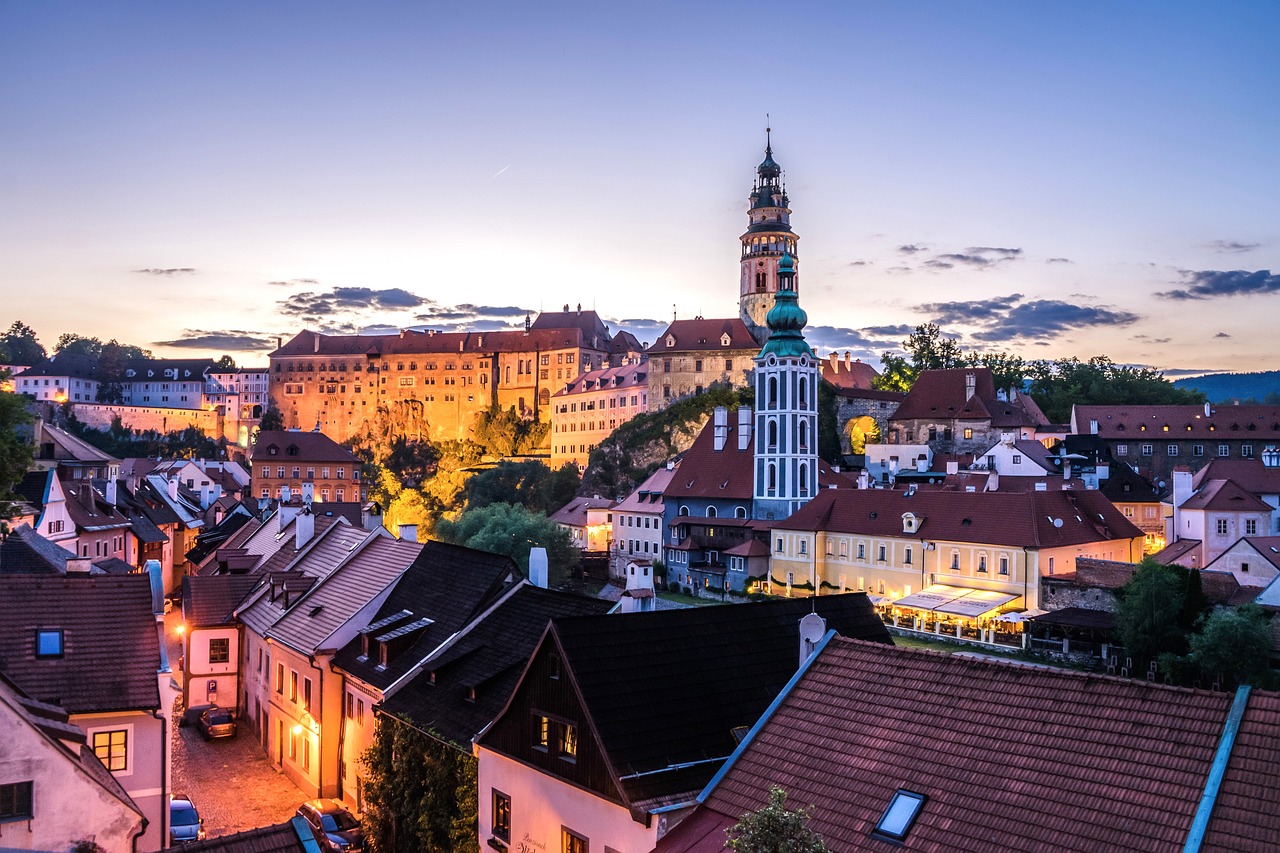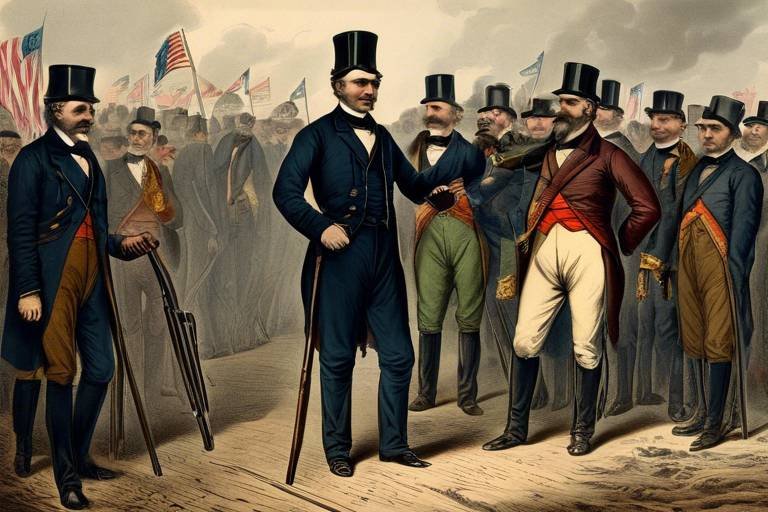The Rise of Nationalism in the 19th Century
Nationalism in the 19th century was like a wildfire, spreading across continents and reshaping the world as we knew it. The roots of this powerful movement can be traced back to a time when nations were emerging from the shadows of empires, eager to assert their unique identities and claim their place on the global stage. The rise of nationalism was not just a political phenomenon; it was a cultural and social awakening that ignited the hearts of people and fueled their desire for self-determination.
As the winds of change swept through Europe, nationalist movements gained momentum, challenging the traditional power structures and paving the way for a new era of nation-states. The fervor of nationalism was palpable, driving people to unite under a common flag and language, breaking free from the chains of colonialism and foreign domination.
The 19th century saw the birth of modern nations, with Germany and Italy leading the way in the quest for unification. Figures like Otto von Bismarck and Giuseppe Garibaldi became heroes of the nationalist cause, rallying their people to fight for independence and unity. The German and Italian unification movements were not just about political alliances; they were about forging a national identity and pride that transcended regional differences.
But nationalism was not confined to Europe alone. In Latin America, countries rose up against their colonial masters, declaring independence and shaping their own destinies. The echoes of nationalist fervor were also heard in Asia, where nations like India, China, and Japan challenged the dominance of Western powers and set the stage for future independence movements.
The legacy of 19th-century nationalism continues to resonate in the modern world, shaping the borders of nations, the identities of peoples, and the dynamics of international relations. The spirit of nationalism, born out of a desire for freedom and self-expression, remains a powerful force that drives nations forward and unites people under a common banner.

Origins of Nationalism
Exploring the emergence and impact of nationalist movements in the 1800s, shaping identities and political landscapes across Europe and beyond.
During the 19th century, the seeds of nationalism were planted in the fertile soil of historical events and ideologies. The concept of nationalism began to take root as people sought to define their identities based on shared language, culture, and history. It was a time when individuals started to identify themselves not just as subjects of a ruler, but as part of a larger community with a common heritage.
One of the key factors that contributed to the rise of nationalism was the French Revolution. The revolutionary ideas of liberty, equality, and fraternity inspired people across Europe to question traditional power structures and envision a new social order based on national sovereignty. The Napoleonic Wars that followed further fueled nationalist sentiments as people fought for independence and self-determination.
Intellectual movements such as Romanticism also played a significant role in shaping nationalist ideologies. Romantic thinkers emphasized the importance of national identity, folklore, and traditions, fueling a sense of pride and belonging among different ethnic groups. This cultural awakening laid the foundation for the nationalist movements that would sweep across Europe in the 19th century.
Moreover, the decline of empires and the rise of nation-states as the dominant political units also contributed to the rise of nationalism. As borders shifted and new states emerged, people began to associate themselves more closely with their nation rather than a larger imperial entity. This shift in political organization paved the way for the rise of nationalist movements seeking to unite people under a common flag and shared values.
In conclusion, the origins of nationalism in the 19th century can be traced back to a combination of historical events, intellectual movements, and political changes that reshaped the way people viewed themselves and their place in the world. This period marked the beginning of a new era where national identity became a powerful force in shaping the course of history.

Nationalism in Europe
Nationalism in Europe during the 19th century was a transformative force that reshaped the political and cultural landscape of the continent. It emerged as a powerful ideology that emphasized the unique identity and sovereignty of individual nations, fueling movements for independence and unification.
One of the key examples of nationalist movements in Europe was the German unification process, spearheaded by the skilled statesman Otto von Bismarck. Through a series of strategic diplomatic maneuvers and military campaigns, Bismarck successfully unified the disparate German states into a single, powerful nation-state. This unification not only strengthened Germany but also served as a model for other nationalist movements across Europe.
Similarly, Italy experienced a fervent push for unification led by figures like Giuseppe Garibaldi. The Italian unification movement aimed to bring together the fragmented Italian states under one flag, emphasizing a shared cultural and historical heritage. Garibaldi's efforts, along with those of other nationalist leaders, eventually led to the creation of a unified Kingdom of Italy in 1861.
These nationalist movements in Europe were not limited to just Germany and Italy. Countries like Poland, Hungary, and Greece also witnessed fervent calls for independence and self-determination during this period. The desire to assert national identity and throw off the yoke of foreign domination was a common theme that resonated across the continent.
Moreover, the rise of nationalism in Europe had a profound impact on international relations and the balance of power. The formation of strong, centralized nation-states altered the traditional political landscape, leading to increased competition and rivalries among European powers. Nationalist sentiments also fueled imperial ambitions and colonial expansion as European nations sought to assert their dominance on a global scale.
In conclusion, the wave of nationalism that swept across Europe in the 19th century left a lasting legacy that continues to shape the continent's identity and politics to this day. The struggles for independence, unification, and self-determination during this period laid the foundation for the modern nation-states of Europe and set the stage for future geopolitical developments.

German Unification
German Unification in the 19th century marked a pivotal moment in the history of nationalism, reshaping the political landscape of Europe. Led by the skilled statesman Otto von Bismarck, the process of unifying various German states into a single nation brought together diverse regions under a common identity. Bismarck's strategic diplomatic maneuvers and military victories played a crucial role in achieving this goal, emphasizing the power of nationalism in uniting people towards a shared cause.
The movement was not merely a political endeavor but a cultural and social awakening for the German people. It ignited a sense of pride and belonging among individuals scattered across different territories, fostering a collective consciousness that transcended regional differences. The idea of a unified Germany became a symbol of strength and solidarity, fueling the aspirations of those seeking self-determination and autonomy.
Through a series of wars and negotiations, Bismarck orchestrated the consolidation of German states, culminating in the proclamation of the German Empire in 1871. This historic event symbolized the triumph of nationalism over feudal fragmentation, laying the foundation for a modern nation-state characterized by a shared language, culture, and heritage. The German Unification process exemplified how a strong sense of national identity could overcome political barriers and forge a cohesive society.
Moreover, the impact of German Unification reverberated beyond the borders of the newly formed nation. It inspired nationalist movements in other European countries, influencing the course of history and challenging existing power structures. The successful unification of Germany served as a powerful example of how unity and determination could lead to the realization of long-standing aspirations for independence and sovereignty.
In conclusion, the of the 19th century stands as a testament to the enduring power of nationalism in shaping the destinies of nations. By uniting disparate regions under a common banner, Germany not only transformed its own identity but also set a precedent for future nationalist movements around the world.

Italian Unification
The Italian unification movement, also known as the Risorgimento, was a pivotal period in the 19th century that saw the consolidation of various Italian states into a unified kingdom. Spearheaded by influential figures like Giuseppe Garibaldi and Count Camillo di Cavour, this movement aimed to liberate Italy from foreign control and establish a cohesive national identity.
Garibaldi, a charismatic military leader, played a crucial role in the unification process through his daring military campaigns and unwavering commitment to the cause. His legendary expedition known as the "Expedition of the Thousand" captured the imagination of Italians and galvanized support for the unification movement.
Meanwhile, Cavour, a skilled statesman and diplomat, employed cunning political strategies to advance the cause of Italian unification. Through alliances with foreign powers and strategic maneuvering, Cavour was able to weaken the influence of foreign powers in Italy and pave the way for unity.
The culmination of these efforts was the establishment of the Kingdom of Italy in 1861, with Victor Emmanuel II proclaimed as its king. This marked a significant milestone in Italian history, symbolizing the triumph of nationalist aspirations over centuries of division and foreign domination.
The Italian unification not only transformed the political landscape of Italy but also inspired nationalist movements across Europe. It served as a powerful example of how a shared sense of identity and purpose could overcome internal divisions and external pressures.
Furthermore, the unification of Italy had far-reaching implications for the balance of power in Europe, challenging the established order and reshaping alliances on the continent. The emergence of a unified Italian state altered the dynamics of European diplomacy and set the stage for future geopolitical developments.

Nationalism Beyond Europe
When discussing nationalism in the 19th century, it is essential to look beyond the borders of Europe to understand the global impact of this powerful ideology. Nationalist movements outside of Europe played a significant role in challenging colonial powers and shaping the identities of nations across Latin America and Asia.
In Latin America, the 19th century was marked by a wave of independence movements that sought to break free from Spanish and Portuguese colonial rule. Visionary leaders like Simón Bolívar and José de San Martín spearheaded these movements, inspiring a sense of national pride and unity among the diverse populations of the region.
Similarly, in Asia, countries such as India, China, and Japan experienced the rise of nationalist sentiments that aimed to assert their independence and sovereignty in the face of Western imperialism. Figures like Mahatma Gandhi in India, Sun Yat-sen in China, and Emperor Meiji in Japan became symbols of resistance and national resurgence.
The impact of nationalist movements beyond Europe reverberated across the globe, challenging traditional power structures and paving the way for future independence struggles. These movements not only shaped the political landscape of their respective regions but also influenced the course of international relations in the years to come.

Latin American Independence
Exploring the emergence and impact of nationalist movements in the 1800s, shaping identities and political landscapes across Europe and beyond.
Examining the historical events and ideologies that laid the groundwork for the rise of nationalism in the 19th century.
Analyzing the nationalist movements in various European countries and their role in shaping the continent's history.
Detailing the process of German unification led by figures like Otto von Bismarck and its significance in the context of nationalism.
Discussing the Italian unification movement and the role of figures like Giuseppe Garibaldi in fostering a sense of national identity.
Exploring how nationalist movements in regions outside of Europe influenced global politics and identities.
The 19th century witnessed a remarkable wave of nationalist movements in Latin America that ultimately led to the independence of various countries from colonial rule. Figures like Simón Bolívar and José de San Martín played pivotal roles in liberating nations such as Venezuela, Colombia, Peru, and Argentina from Spanish dominance. These movements were fueled by a strong sense of cultural identity and a desire for self-governance, marking a significant shift in the political landscape of the region.
Investigating the rise of nationalist sentiments in countries like India, China, and Japan, challenging colonial powers and shaping future independence movements.
Reflecting on the lasting impact of 19th-century nationalism on modern states, identities, and international relations.

Asian Nationalism
Asian Nationalism in the 19th century was a potent force that reshaped the political landscape of the region, challenging colonial powers and laying the groundwork for future independence movements. Countries like India, China, and Japan experienced a surge in nationalist sentiments, driven by a desire for self-determination and resistance against foreign domination.
In India, figures like Mahatma Gandhi and Jawaharlal Nehru spearheaded the nationalist movement against British colonial rule, advocating for non-violent resistance and civil disobedience. The Indian National Congress played a crucial role in uniting diverse groups under the common goal of independence, leading to the eventual partition of India and the creation of Pakistan.
Similarly, in China, the Qing Dynasty faced internal turmoil and external pressure from Western powers seeking to expand their influence. The Boxer Rebellion, fueled by nationalist fervor, aimed to expel foreign forces from China and preserve traditional Chinese values. The movement ultimately failed but laid the groundwork for the overthrow of the imperial system and the establishment of the Republic of China.
Japan, on the other hand, embraced nationalism as a means of modernization and expansion. The Meiji Restoration marked a period of rapid industrialization and political reform, positioning Japan as a regional power in East Asia. Nationalist ideologies were used to justify imperial expansion, leading to conflicts like the First Sino-Japanese War and the Russo-Japanese War.
Overall, Asian Nationalism in the 19th century was a complex and multifaceted phenomenon, driven by a mix of anti-colonial resistance, cultural revivalism, and aspirations for self-governance. The legacy of these nationalist movements continues to shape the political dynamics of the region to this day, highlighting the enduring impact of 19th-century nationalism on Asia's modern identity and geopolitical landscape.

Legacy of 19th-Century Nationalism
Nationalism in the 19th century left a profound mark on the world, shaping the course of history and influencing the development of modern states and identities. The legacy of 19th-century nationalism can be seen in various aspects of contemporary society, from political structures to cultural identities.
One of the most significant legacies of 19th-century nationalism is the establishment of nation-states based on shared language, culture, and history. The concept of a nation as a unified community with a common identity and purpose became a driving force behind the formation of new countries and the restructuring of existing ones.
Moreover, the emphasis on national sovereignty and self-determination that emerged during this period continues to influence international relations today. The idea that nations have the right to govern themselves and determine their own destinies remains a fundamental principle in global politics.
Additionally, the legacy of 19th-century nationalism can be seen in the cultural movements that emerged as a result of national identity. Literature, art, and music began to reflect the unique characteristics of different nations, celebrating their heritage and traditions.
Furthermore, the legacy of 19th-century nationalism is evident in the ongoing struggles for independence and autonomy in regions around the world. The desire for self-rule and the preservation of cultural identity continue to drive movements for sovereignty and recognition.
In conclusion, the legacy of 19th-century nationalism is a complex and enduring phenomenon that has shaped the modern world in profound ways. By understanding the origins and impact of nationalist movements in the past, we can gain insight into the complexities of contemporary political and social dynamics.
Frequently Asked Questions
- What is nationalism?
Nationalism is a political ideology that emphasizes the nation as a central unit of identity. It promotes the interests and culture of a particular nation, often to the detriment of other groups or nations.
- How did nationalism impact Europe in the 19th century?
Nationalism in the 19th century played a significant role in the unification of countries like Germany and Italy, as well as the independence movements in Latin America and Asia. It reshaped political boundaries and identities across the continent.
- Who were some key figures in the German unification movement?
Figures like Otto von Bismarck, known as the "Iron Chancellor," played a crucial role in the process of German unification through diplomatic and military strategies.
- What was the significance of Italian unification?
The Italian unification movement, led by figures like Giuseppe Garibaldi, aimed to unify the Italian states and create a single nation. It contributed to the formation of modern Italy and fostered a sense of national identity among Italians.
- How did nationalism influence global politics beyond Europe?
Nationalist movements in regions like Latin America, India, China, and Japan challenged colonial powers and paved the way for independence movements. They also influenced international relations and the formation of new states.



















